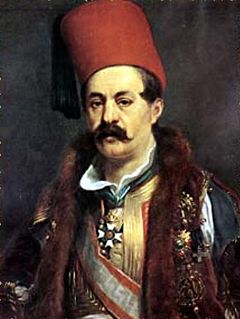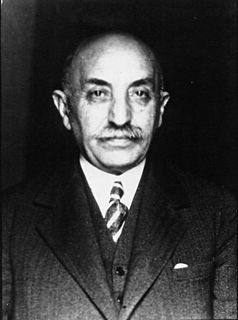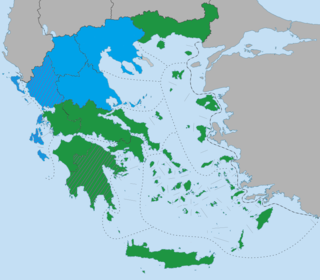This page is based on this
Wikipedia article Text is available under the
CC BY-SA 4.0 license; additional terms may apply.
Images, videos and audio are available under their respective licenses.
Ioannis Grivas was a Greek judge, who served as President of the Court of Cassation and served as the Prime Minister of Greece at the head of a non-party caretaker government in 1989.
This article gives an overview of liberalism in Greece. It is limited to liberal parties. The sign ⇒ denotes another party in that scheme. For inclusion in this scheme it isn't necessary so that parties labeled themselves as a liberal party.

Nikolaos Plastiras was a Greek general and politician, who served thrice as Prime Minister of Greece. A distinguished soldier known for his personal bravery, he became famous as "The Black Rider" during the Greco-Turkish War of 1919-1922, where he commanded the 5/42 Evzone Regiment. After the Greek defeat in the war, along with other Venizelist officers he launched the 11 September 1922 Revolution that deposed King Constantine I of Greece and his government. The military-led government ruled until January 1924, when power was handed over to an elected National Assembly, which later declared the Second Hellenic Republic. In the interwar period, Plastiras remained a devoted Venizelist and republican. Trying to avert the rise of the royalist People's Party and the restoration of the monarchy, he led two coup attempts in 1933 and 1935, both of which failed, forcing him to exile in France.

Elections in Cyprus gives information on election and election results in Cyprus.

Ioannis Kolettis was a Greek politician who played a significant role in Greek affairs from the Greek War of Independence through the early years of the Greek Kingdom, including as Minister to France and serving twice as Prime Minister.

Konstantinos Tsaldaris was a Greek politician and twice Prime Minister of Greece.
The Coalition of the Radical Left, mostly known by the syllabic abbreviation Syriza is a political party in Greece originally founded in 2004 as a coalition of left-wing and radical left parties.

The National Schism was a series of disagreements between King Constantine I and Prime Minister Eleftherios Venizelos regarding the foreign policy of Greece in the period of 1910–1922 of which the tipping point was whether Greece should enter World War I. Venizelos was in support of the Allies and wanted Greece to join the war on their side, while the pro-German King wanted Greece to remain neutral, which would favor the plans of the Central Powers.

Panagis Tsaldaris was a Greek politician and the 48th Prime Minister of Greece. He was a revered conservative politician and leader for many years (1922–1936) of the conservative People's Party in the period before World War II. He was the husband of Lina Tsaldari, a Greek suffragist, member of Parliament, and the Minister for Social Welfare.
The 2002 Greek local elections elected representatives to Greece's super-prefectures, 54 prefectures, provinces, and approximately 1,033 communities and municipalities.
The Panhellenic Union of Fighting Youths was a Greek Resistance organization during the Axis Occupation of Greece in the Second World War. The organization was concentrated in the areas of Athens and Piraeus, and although it never expanded to become a wider movement, it was one of the most active of the multitude of urban resistance groups that sprung up during the Occupation, and one of the first to carry out active resistance, in the form of bombings.
Ioannis (Yannis) Banias was a Greek politician, and former member of the Hellenic Parliament for the Coalition of Radical Left (2007–2009).
The Leonardopoulos–Gargalidis coup attempt was a failed military coup launched on 22 October 1923 in Greece by pro-royalist military officers under the Lieutenant Generals Georgios Leonardopoulos and Panagiotis Gargalidis, and the Colonel Georgios Ziras. Its failure discredited the monarchy and contributed decisively to the establishment of the Second Hellenic Republic in March 1924.

The Deputy Prime Minister of Greece is the second senior-most member of the Greek Cabinet. Despite the English translation of the title, he does not actually deputize for the Prime Minister, rather it is a mostly honorific post for senior ministers, and is usually combined with another senior government portfolio or a coordinating role over several ministries. The post is not permanent, rather it is created on an ad hoc basis, usually for the leaders of junior parties in coalition cabinets, and may be held by more than one person at once.
The Fourth National Assembly at Argos was a Greek convention which sat at Argos from 11 July to 6 August 1829, during the Greek War of Independence.

The 2010 Greek local elections were held on 7 November 2010 and 14 November 2010 to elect representatives to Greece's restructured local authorities, comprising 13 regions and 325 municipalities.

Metaxism is a totalitarian nationalist ideology associated with Greek dictator Ioannis Metaxas. It called for the regeneration of the Greek nation and the establishment of a modern, culturally homogenous Greece. Metaxism disparaged liberalism, and held individual interests to be subordinate to those of the nation, seeking to mobilize the Greek people as a disciplined mass in service to the creation of a "new Greece."

Popular Unity is a left-wing political party in Greece.













